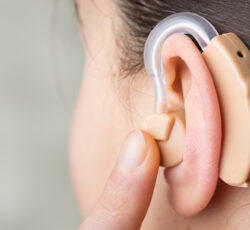 Living with hearing impairment can be challenging, impacting various aspects of daily life. Fortunately, advancements in technology have given rise to innovative solutions, and hearing aids stand out as a beacon of hope for those seeking to enhance their auditory experiences. In this comprehensive guide, we will explore the various aspects of hearing aids, from understanding the different types available to how they work and the benefits they offer.
Living with hearing impairment can be challenging, impacting various aspects of daily life. Fortunately, advancements in technology have given rise to innovative solutions, and hearing aids stand out as a beacon of hope for those seeking to enhance their auditory experiences. In this comprehensive guide, we will explore the various aspects of hearing aids, from understanding the different types available to how they work and the benefits they offer.
Understanding Hearing Loss:
Before delving into hearing aids, it’s crucial to understand the different types and degrees of hearing loss. Hearing loss can be sensorineural, conductive, or a combination of both. Sensorineural hearing loss involves damage to the inner ear or auditory nerve, while conductive hearing loss results from problems with the ear canal, eardrum, or middle ear. Once the type and degree of hearing loss are identified, a suitable hearing aid can be recommended.
Types of Hearing Aids:
Hearing aids come in various styles, each designed to address specific needs and preferences. Behind-the-ear (BTE) aids are versatile and suitable for various degrees of hearing loss. In-the-ear (ITE) and in-the-canal (ITC) aids are custom-molded to fit inside the ear, providing a more discreet option. Completely-in-the-canal (CIC) and invisible-in-the-canal (IIC) aids are the smallest and least visible, fitting deep within the ear canal.
How Hearing Aids Work:
Regardless of the type, all hearing aids work on the same basic principle. A microphone in the device picks up sound, which is then processed by an amplifier. The amplified sound is delivered to the ear through a speaker. Modern hearing aids often come with advanced features like directional microphones, noise reduction, and feedback suppression, providing a more natural and enhanced listening experience.
Benefits of Using Hearing Aids:
The benefits of using hearing aids extend beyond simply restoring the ability to hear. Improved communication is a primary advantage, allowing users to participate more actively in conversations, whether in professional or social settings. Hearing aids also contribute to better mental health by reducing feelings of isolation and frustration often associated with hearing loss. Additionally, studies suggest that addressing hearing loss promptly may lower the risk of cognitive decline and improve overall cognitive function.
Customization and Programming:
One of the key strengths of modern hearing aids is their customization. Audiologists use various tests to assess an individual’s hearing profile, enabling them to program the hearing aid to address specific frequencies and levels of hearing loss. This personalized approach ensures that the device is optimized for the user’s unique needs, offering a tailored and effective solution.
Overcoming Challenges with Hearing Aids:
While hearing aids significantly improve auditory experiences, users may encounter challenges during the adjustment period. It’s common to feel overwhelmed by the sudden influx of sounds or experience discomfort due to the fit. Patience and consistent use are crucial during this phase, and regular follow-ups with an audiologist help fine-tune the settings for optimal comfort and performance.
Caring for Your Hearing Aid:
Proper maintenance is essential to ensure the longevity and effectiveness of hearing aids. Regular cleaning, changing batteries, and storing the device in a dry and secure place are fundamental aspects of care. Additionally, users should be mindful of environmental factors, such as humidity and extreme temperatures, which can impact the functionality of the device.
Embracing the Lifestyle Change:
Using hearing aids often involves a lifestyle change, but it’s one that brings about positive transformation. From participating in social gatherings with confidence to enjoying the nuances of music and nature, hearing aids open up a world of auditory experiences that may have been muted before. Embracing this change is a key step towards a more fulfilling and enriched life.
Summary:
In the journey to enhancing your hearing with aid, knowledge is a powerful ally. Understanding the types of hearing loss, the diverse range of hearing aids available, and the benefits they offer empowers individuals to make informed decisions about their auditory health. With the right hearing aid, customized to individual needs and preferences, the path to improved communication and a richer sensory experience becomes clearer. If you or someone you know is grappling with hearing loss, consider the transformative impact that hearing aids can have on the quality of life.
Need Hearing Aids in Willis, TX?
Since 1944, Hearing Aids of Texas has been family owned and operated. The owner, George, is a car enthusiast who uses his engineering prowess to help individuals get the hearing aids they need. He does tuning, fitting, and modifying. Also, we are the only hearing aid dispenser in North America to use sound pressure level (SPL) tests to match hearing aids to applied science and acoustic accuracy. We work on all brands of hearing aids. Call us today! We are by appointment only.
